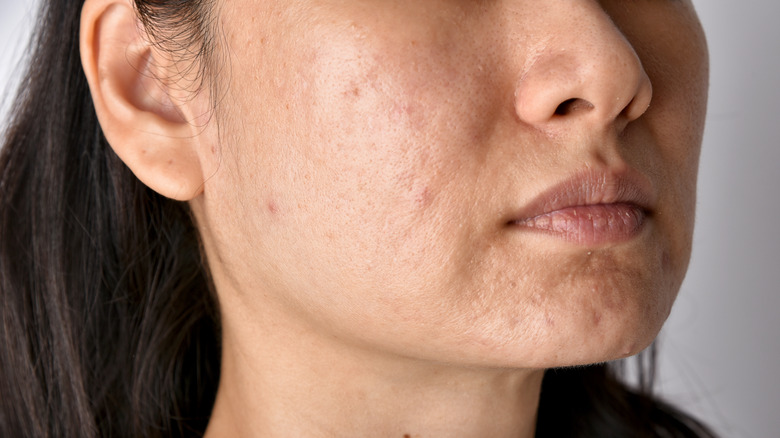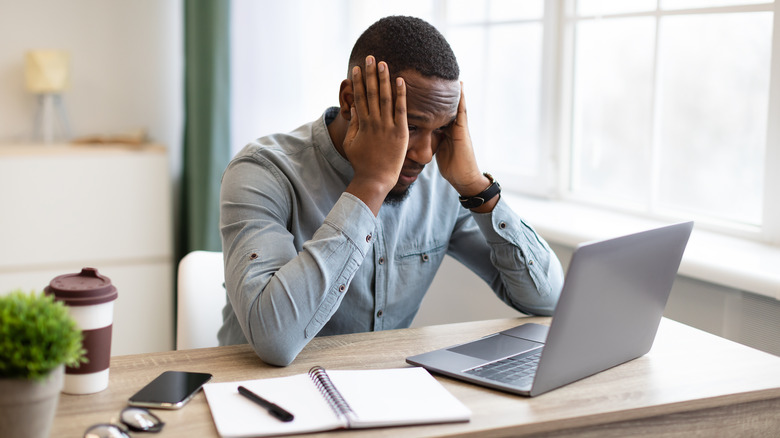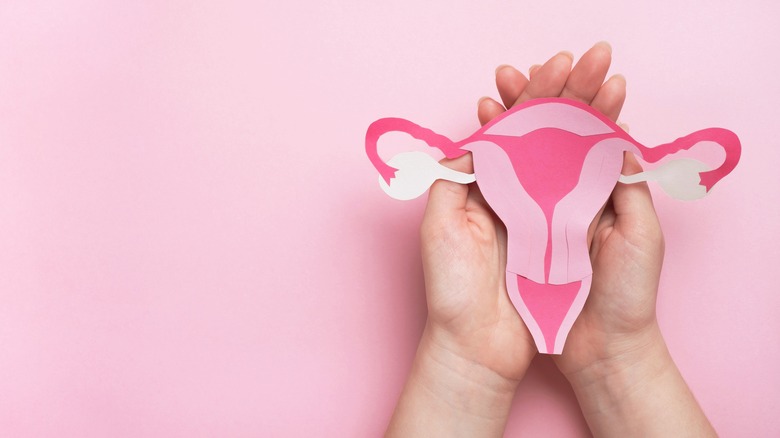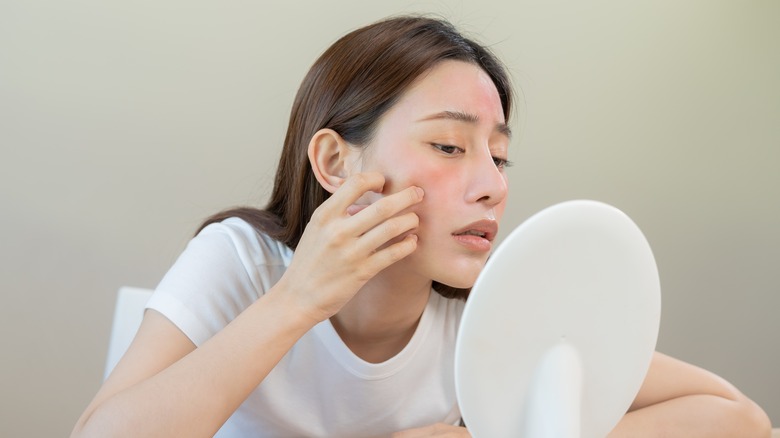Sneaky Causes Of Breakouts That May Surprise You
When you're trying your best to avoid breakouts, it's frustrating when they still happen. Sometimes it seems like nothing you do can stop them. But even if you think you've got your breakout game down, there may be some sneaky causes of breakouts that you're not aware of. According to the National Health Service, breakouts occur when your pores become clogged with sebum, a type of oil that your skin produces. This can happen for a variety of reasons, including hormone changes, certain medications, and even wearing makeup.
Anyone can get breakouts, regardless of age or gender, although they are more common in younger people. If you experience breakouts regularly and can't determine a cause, visit a dermatologist. They can help you identify any underlying conditions or lifestyle habits that may be contributing to the bumps on your face, as well as help you find a treatment plan. Acne and breakouts are typically treated with topical creams, antibiotics, or lifestyle changes. Here are some causes of breakouts that may surprise you.
Too much stress
Stress can cause a variety of physical and mental health problems, and breakouts are one of them. When you're stressed, your body produces the hormone cortisol. According to the American Academy of Dermatology, cortisol can stimulate the production of sebum, which can lead to clogged pores and breakouts. If you find that you tend to break out when you're under a lot of stress, try reducing your stress levels and see if your skin improves. Exercise, meditation, and deep breathing can all help reduce stress levels, as well as talking to a therapist if your stress is severe or chronic.
Stress can also cause health issues including physical symptoms like headaches and stomachaches, as well as emotional symptoms like anxiety and depression (via WebMD). Chronic stress can increase your risk of developing many health conditions, including obesity, heart disease, and diabetes (via Everyday Health). Speak with a doctor or therapist if you feel like you can't control your stress levels.
Not cleaning your phone
You probably clean your face several times a day, but when was the last time you cleaned your phone? If you don't clean it regularly, your phone can collect dirt, dust, and oil from your face, which can then transfer back to your skin and cause breakouts (via Allure). Wipe down your phone with a disinfecting wipe or alcohol pad every few days to remove any buildup. You should also clean your case regularly. If you use headphones, make sure they're clean as well since they can also harbor bacteria.
Acne isn't the only reason to clean your phone often. Researchers at the University of Arizona found that smartphones often have 10 times more bacteria than a toilet seat. Studies have found E. coli, MRSA, and Streptococcus, among other kinds of bacteria, on mobile devices (via Business Insider). Neglecting to clean your phone regularly can lead to these bacteria coming into contact with your face and causing skin infections and other health issues.
A poor diet
If you're eating a lot of unhealthy foods, it can show up on your skin. While no foods are known to explicitly cause acne, high glycemic foods can make your acne worse (via Healthline). This includes foods like baked goods, sugary drinks, and chips. These foods cause a spike in blood sugar levels, which then triggers a hormone called insulin. Insulin increases the production of sebum, which can lead to clogged pores and breakouts.
If you suspect that your diet may be causing your breakouts, try removing some high glycemic foods from your day and see if your skin improves. You can also try eating more fruits, vegetables, and lean protein, which are lower on the glycemic index and won't cause your blood sugar levels to spike as much. While it's okay to eat all kinds of foods in moderation, you may find that your breakouts improve when you choose to eat high glycemic foods sparingly.
Hormonal changes
Acne is common during puberty because of the hormonal changes that occur during this time. However, hormonal changes can also cause breakouts later in life. If you find that you're breaking out around your period or during menopause, it's likely due to hormones (via Healthline). When your estrogen levels drop, it can stimulate the production of testosterone, which then leads to an increase in sebum production and clogged pores. Hormones can also make your skin inflamed and create more bacteria that can lead to more acne. Increased stress during your period, which is a common side effect of PMS, can also lead to more breakouts.
Birth control pills and other hormone therapies can help regulate hormone levels and improve acne. You should also wash your face daily with a face wash that contains acne-fighting ingredients like salicylic acid or benzoyl peroxide (via Cleveland Clinic). If you think hormones may be causing your breakouts, speak with a doctor about treatment options.
Touching your face
If you find that you're breaking out in a particular area of your face, it may be because you're touching that area too much. Whether you're resting your chin on your hand or picking at your skin, touching your face can transfer bacteria from your hands to your face and cause breakouts (via Allure). If you have the habit of touching your face, try to become aware of it and make an effort to stop. You may also want to try washing your hands more often throughout the day to remove any build-up of bacteria.
This same principle applies to letting anything dirty touch your face. Applying makeup with dirty brushes and sleeping on a dirty pillowcase can also cause breakouts (via Southeastern Dermatology). Make sure you're regularly cleaning your makeup brushes and washing your pillowcase to prevent bacteria from coming in contact with your skin. You should also frequently clean washcloths, bedding, and anything else that your face comes in contact with.






